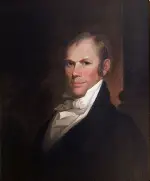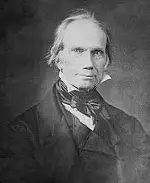Henry Clay: American Statesman
Part 1: Early Days Henry Clay was one of the most famous members of Congress in the first half of the 19th Century. A staunch defender of the Constitution and an abolitionist, he also sought to avoid bloodshed over slavery by proposing a number of political compromises, earning him the title of the "Great Compromiser." 
Clay was born in Hanover County, Va., on April 12, 1777. His parents in all had nine children, of which he was the seventh. He had somewhat of a formal education and most notably studied law with George Wythe, who had signed the Declaration of Independence and had also taught Thomas Jefferson and John Marshall. Wythe introduced Clay to Robert Brooke, who was his final mentor. Clay had a flair for oratory, and this enabled him to gain a reputation as a successful and trusted lawyer soon after he set up a practice in Lexington, Ky., after moving there in 1797. One of his most famous clients was Aaron Burr, who had served as Vice-president in 1800 and had killed Alexander Hamilton in a duel in 1804. Burr faced charges of conspiracy in 1806. Clay thought that Burr was innocent and agreed to defend him; Clay changed his mind when he found out that the allegations were true. (Clay himself was wounded in a duel, in 1809, with another lawyer, Humphrey Marshall.) He married Lucretia Hart in 1799. They had 11 children together in more than 50 years of marriage. 
Clay expressed an interest in politics and eventually embraced it wholeheartedly. At first, he was a supporter of Jefferson and the Democratic-Republican Party. Clay, along with Jefferson and others, spoke out against the Alien and Sedition Acts. He found himself elected to the Kentucky legislature in 1803 and then a member of the U.S. Senate, serving out the unexpired term of John Adair from 1806 to 1807. Re-elected to the Kentucky state house in 1807 and 1809, he also got himself elected speaker of the House. He left for Washington again in 1810, again to serve out a Senate term initially won by someone else, this time Buckner Thruston. Clay himself won election to the U.S. Congress in 1811, representing the 5th District. That body elected him Speaker as well. He was re-elected in 1815, 1817, and 1819 and then in 1823. He also represented the 2nd District and the 3rd District. Clay was a War Hawk, believing that the United States should press for war with Great Britain, which came in the form of the War of 1812. He also found himself involved in negotiations to end the war, resulting in the Treaty of Ghent. Next page > Political Legacy > Page 1, 2 |
|
Social Studies for Kids
copyright 2002–2024
David White




